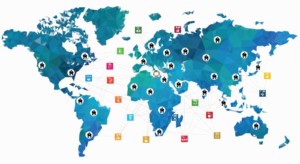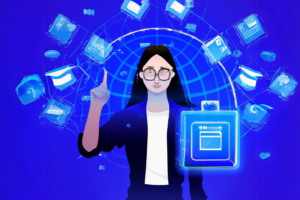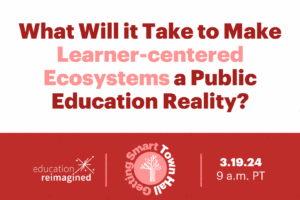Proposal For An Innovation Diploma

Concept: Create a new competency-based high school diploma framework focused on innovation. A diploma that would represent preparedness for the automation economy.
Background: High school graduation requirements have been pretty static since the Committee of Ten recommendations in 1894. They focus on the traditional path of scholarship and success in college.
The International Baccalaureate (IB) Diploma Programme is recognized worldwide. High schools join the network and colleges recognize the diploma based on the value of the proposition. It’s demanding, but it doesn’t focus on innovation.
What’s New: We live in a “show what you know” world where it matters more what you can do than where you went to college. Smart technologies are reshaping the employment landscape. Job and career readiness are becoming more important than college readiness.
Developments: Five New England states have adopted proficiency-based diploma policies moving high schools and colleges toward competency-based education. The expectations are a mix of traditional and work ready standards (e.g., Maine has guiding principles and Vermont promotes transferable skills).
Opportunity: Create new standards for high school completion and post-secondary acceptance. Participating universities would/could offer automatic entrance and a year of college credit.
Concept: Ask students to complete and present 20 projects (or more broadly, successful learning experiences). Four to six per year over three or four years, including:
- Launch a business or sustainable initiative (entrepreneurship)
- Build a mobile app (for the business/initiative)
- Secure and serve a customer with marketing services
- Demonstrate success in two work settings (internship)
- Visit two of the world’s greatest cities and compare sustainable development
- Propose a solution to a global health challenge
- Propose a strategy to extend social justice
- Conduct a science experiment and publish the results
- Complete at least two college courses (one online)
- Use data to solve a local problem (community service)
- Publish 40 reviews/reflections (individual) in science and social science
- Publish two major works: papers, books and/or sites (team)
- Produce and present two works of public art (performance, exhibit)
- Explain 10 emerging implications of artificial intelligence on lives/livelihoods
- Apply to a valuable post-secondary experience (college or equal)
Some of these projects/experiences could be completed on a team and some as an individual. They would all help develop and demonstrate 10 important success skills in 20 microcredentials (about two in each skill category):
- Self-directed learners
- Skilled communicators
- Design thinkers and persistent innovators
- Effective entrepreneurs
- Empathetic collaborators
- Resourceful problem solvers
- Data & AI literate
- Global citizens
- Experienced project managers
- Exhibiting health and wellness
If graduation requirements were described as 20 projects and 20 microcredentials, it would allow students to attack the requirements in their own way and at their own pace, often working in teams and cohorts. The key would be sustained relationships with skilled advisors who could help construct projects mapped to important skills.
Pilot and Scale: The innovation diploma could be piloted with one high school and one college and then extended statewide, and then nationwide–adding colleges that recognize the diploma where there are high schools interested in offering it.
Like the IB, it would afford an alternative high school experience, and in doing so would advance personalized and competency-based learning while preparing thousands of youth for the innovation economy.
This post is an update to a 2016 post on rethinking grad requirements.
For more, see:
- Grad Requirements: From Know Science, To Do Science, To Automate Science
- It’s Time to Update Your Graduate Profile – Here’s How (Podcast with Ken Kay)
- Community Conversations Shape Portrait of a Graduate
Stay in-the-know with all things EdTech and innovations in learning by signing up to receive the weekly Smart Update.








Tom
A group of superintendents at a KnowledgeWorks event thought the list of experiences was too prescriptive, suggested sticking to the microcredentials. Think of list of experiences like curriculum which might be school or network specific
Larry Jensen
Good article. Makes me think of how vertical our K-12 system truly is. "Knowing" as a precursor (or even a prerequisite to "Doing" has been the thought in middle school and higher. Not so in elementary schools, where project-based learning and hands-on learning have long been the unquestioned course, and with great results. Visit a kindergarten classroom and see the excitement as children collaborate, brainstorm, plan, think, and complete tasks and projects. Communication is a given in a setting like that, but the happy and natural learning environment becomes crushed when outcomes are based on test scores, and the test scores are the result of irrelevant content-driven, mind-numbing classes. In Florida, this "accountability" focus has seeped down to the third grade, with an onerous requirement of a reading score before a child can advance to grade four. The learning superhighway takes an unfortunate exit to Boredom.